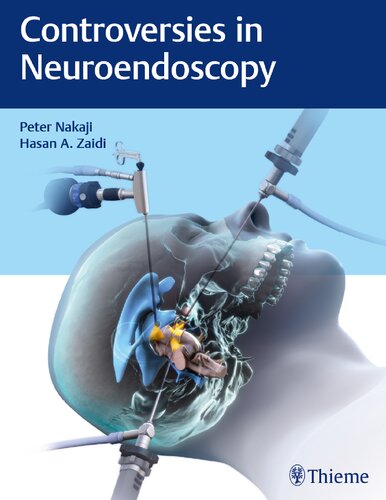

Most ebook files are in PDF format, so you can easily read them using various software such as Foxit Reader or directly on the Google Chrome browser.
Some ebook files are released by publishers in other formats such as .awz, .mobi, .epub, .fb2, etc. You may need to install specific software to read these formats on mobile/PC, such as Calibre.
Please read the tutorial at this link: https://ebookbell.com/faq
We offer FREE conversion to the popular formats you request; however, this may take some time. Therefore, right after payment, please email us, and we will try to provide the service as quickly as possible.
For some exceptional file formats or broken links (if any), please refrain from opening any disputes. Instead, email us first, and we will try to assist within a maximum of 6 hours.
EbookBell Team

0.0
0 reviewsA unique perspective on neuroendoscopic versus microsurgical techniques from world-renowned neurosurgeons
In the last two decades, neuroendoscopy has evolved from a fringe neurosurgical tool to an established subspecialty focusing on the treatment of diverse cranial and spinal diseases. Today, neuroendoscopic technology is widely used to treat supratentorial diseases, skull base pathologies, craniocervical diseases, and spinal pathologies. Despite the expanded use of neuroendoscopy across several subspecialties, its benefits and disadvantages versus those of traditional microsurgical methods remain highly controversial. Contradictory evidence in the neurosurgical literature adds to the surgical decision-making challenges for veteran and novice practitioners alike.
Controversies in Neuroendoscopy by Peter Nakaji and Hasan Zaidi fills an unmet need for a book encompassing best practices, patient selection, and limitations and advantages of neuroendoscopic surgical approaches. Each case presents firsthand knowledge of internationally esteemed neurosurgeons, with a moderator, an endoscopic expert, and an expert in traditional microsurgical approaches. The unique discussion of neuroendoscopy versus microsurgery enables readers to compare the benefits and pitfalls of endoscopic and open microsurgical procedures for a wide range of conditions.
Neurosurgery residents, neurosurgeons, and spine surgeons will all benefit from reading this remarkable book cover to cover, and they will no doubt use it as a go-to resource for specific cases.
This book includes complimentary access to a digital copy on https://medone.thieme.com.